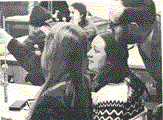ADAPT Program (Accent on Developing Abstract Processes of Thought)

ADAPT Program: Essays
Date of this Version
October 1982
Abstract
Although the attention given to problems of teaching sociology greatly increased during the 1970's, the implications of Piaget's ideas for college level instruction remained unexplored by most sociologists. In 1978, only one of twenty-five articles published in Teaching Sociology, the discipline's only journal devoted to teaching-related issues, contained references to Piaget's work. Thus, the social problems course offered through the ADAPT program during the 1980 spring semester represents one of the few attempts to apply Piaget to teaching sociology in a university classroom.
Recent developments in social problems theory (Spector and Kitsuse, 1977) are complementary to the constructivist epistemology underlying Piagetian theory and research. From the end of World War II through the 1960's, most sociologists viewed social problems as objective conditions which negatively affected large numbers of people. The difficulty with this perspective is that many “problems” which upset large sections of the general public, such as long hair on males in the 1960’s, are not demonstrably harmful. And others, such as witches in Puritan Massachusetts, simply do not exist as empirical phenomena. Recognition of the inherent problems with the objectivist approach to social problems has created renewed interest in the value-conflict perspective originally developed in the 1930’s. Instead of studying conditions alleged to constitute social problems, proponents of this school concentrate on the definitional processes through which groups define selected characteristics of their social environment as problems requiring corrective measures. In other words, the focus is on how people “construct” social problems. The ADAPT course was taught from the value-conflict perspective

